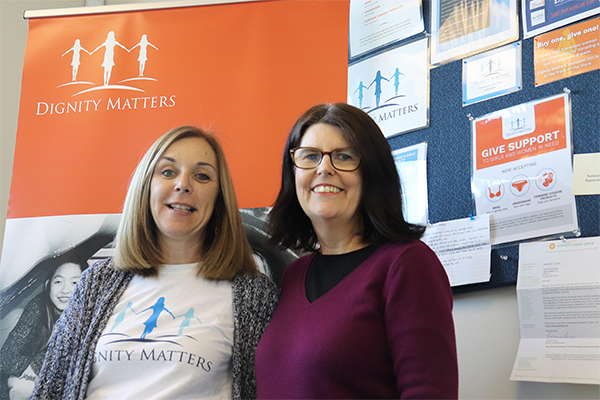Discovering that tens of thousands of women in the U.S.A. do not have access to feminine hygiene products, Kate Sanetra-Butler of Wayland founded Dignity Matters, an organization whose mission is to provide underwear, pads, tampons, and bras to women and girls who cannot otherwise afford them, in a manner that restores dignity.
“Women and girls we assist are commonly single mothers, low-income or homeless women or women and teens who escaped domestic violence and cannot safely return home,” said Sanetra-Butler.
Feminine hygiene products are not covered by SNAP or WIC, but “simply allowing sanitary napkins or tampons to be purchased with food stamps without increasing the value of food stamps would not be a sufficient solution,” said Sanetra-Butler. “Women would need to continue choosing between purchasing food and purchasing feminine hygiene items as food stamps are not enough to support women in need.”
As the need is so ubiquitous, Sinetra-Butler has created a network with local chapters in many towns, and a five-pronged approach. Through “Dignity at Schools,” “Dignity at Medical Clinics,” “Dignity at Shelters,” and “Dignity in the Community,” the organization supplies pads, tampons, sports bras and underwear to middle schools and high schools, clinics, shelters, and food pantries in Boston and eastern Massachusetts.
In schools, products collected and purchased by Dignity Matters are distributed directly to girls in need though Catie’s Closet, which provides clothing, shoes and now feminine hygiene products to the poorest public schools in the state.
Through the fifth program, “Dignity Beneath the Blouse,” they provide personal fittings for underwear and bras “to ensure best fit, freedom of choice and a dignified experience,” said Sanetra-Butler. “We fit up to 150 women with three to four bras at the time.”
The mission of Dignity Matters involves more than a simple delivery of products. Sanetra-Butler believes that “women around the world are the most powerful, yet largely untapped, resource in the fight to break the cycle of poverty that entraps families and communities from generation to generation.” The ability to take care of their bodily needs is necessary to “stay healthy, regain self-confidence and dignity and be able to step up.”
In Natick, Dignity Matters provides products to Metrowest Family Promise, Natick Service Council and A Place to Turn.
The Natick Chapter of Dignity Matters is comprised of Ivylee Martinez and Kelsey Hampton, co-leaders, and Liz Henderson and Dawn Sullivan. Martinez, after meeting Sanetra-Butler through a mutual friend, felt compelled to volunteer with the organization. “I never knew that women and teens were going without underwear and bras, as well as feminine products. It was something I always took for granted.”
Martinez is the mother of twin teenagers, one of whom is organizing a drive at Natick High School as a National Honor Society project. El Martinez is a junior at NHS and will set up bins to collect products from students, staff and faculty during the month of February. The Longfellow Health Club in Natick provides a blue bin for year-round collections in their lobby. “We are looking for local merchants, offices and/or individuals to run a drive using our notable blue bins or collecting monetary donations. Over the past two years, The Natick Public Library, Roche Brothers and Stop and Shop have all hosted our blue bins for our spring and fall drives,” said Martinez.
Initially, Dignity Matters solely collected products through drives and through purchases from their Amazon wishlist. “But as the word has gotten out,” said Martinez, “we have received more monetary donations from groups like 100 Women Who Care of Needham for over $10,000 and individuals like a student from MIT who raised $500. Monetary donations help us to purchase manufactured sanitary napkins for a fraction of the retail price. We also received a grant this past fall from Eastern Bank. This grant money is going towards providing product to medical clinics for homeless women and children run by The Boston Health Care for Homeless program.”
“In the absence of pads or tampons”, said Sanetra-Butler, “we hear a lot of stories of local women using socks and newspapers.”
“My hope for the future,” said Martinez, “is that an organization like Dignity Matters would not have to exist. For right now, we hope that the service we provide is allowing more women and girls the chance to feel safer, securer and supported by the work of other women who truly care.”
For more information, visit www.dignity-matters.org, which provides a map of drop-off locations and instructions to host your own collection event.

